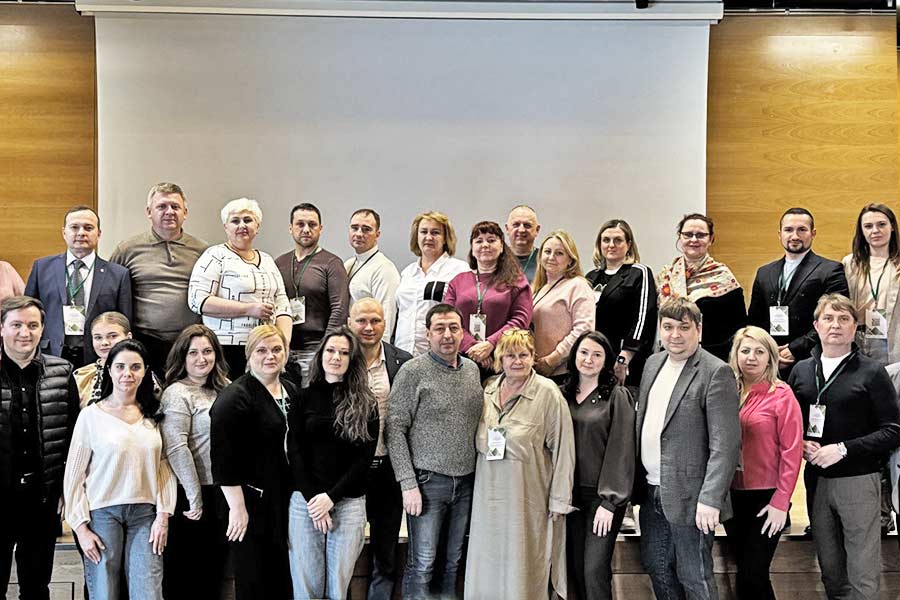“When the creation of the Platform began in 2018-19, journalists were sceptical about how it would work. But now we can safely say that certain results have been achieved. With your activity, you have done quite a significant thing – you have changed the perception of just transition at the level of the opinions of the residents of coal regions themselves.” – Maksym Zabelia, Myrnohrad city newspaper “Ridne Misto”; Myrnohrad City Council.
On 28-30 March, two events were held under the theme “Transition of Coal Regions: From Theory to Project Implementation”, which brought together about 80 representatives of the Platform for Sustainable Development of Coal Towns of Donetsk Region, coal and coal-dependent communities from other regions of Ukraine, NGOs, trade unions, businesses, vocational and higher education institutions.
The events were supported by the German Federal Ministry for Economic Cooperation and Development (BMZ) and the German Federal Ministry for Economic Affairs and Climate Action (BMWK) in cooperation with Deutsche Gesellschaft für Internationale Zusammenarbeit (GIZ). They brought together participants to discuss the reconstruction and recovery of coal communities and the planning of transformative projects, laying the groundwork for their sustainable future and contributing to Ukraine’s economic development in the context of the European integration.
On the first day, the event focused on developing plans and strategies for the comprehensive recovery and development of communities facing challenges related to the coal industry and Russia’s full-scale invasion. In particular, during the discussion of the inevitability of coal phase-out and the factors that determine this process after 24 February 2022, the following was mentioned:
- the current state of the coal industry: at least 11 state-owned mines have ceased operations and coal production has decreased;
- partial loss of the generation: 44% of nuclear, 80% of thermal generation;
- the losses incurred by the coal industry and the inexpediency of rebuilding the lost capacities due to the need to achieve the decarbonisation goals and gradual phase-out of coal by 2035 in power generation (as currently envisaged by the Energy Strategy 2050 and the National Energy and Climate Plan 2030).
At the same time, it is already clear that all coal communities are united by the need for green transition projects that can provide energy resillience and reduce vulnerability to today’s challenges. It is important for coal communities to become centres for the development of new recovery projects based on the priorities of the energy transition. In addition, it is worth developing recovery projects aimed at international technical assistance in the energy sector, regardless of the community’s location.
The implementation of projects also depends on funding and the areas for which donor organisations are willing to provide it. However, it is important not to forget about soft projects that can be implemented even if hostilities are ongoing in the community or near it. And even if it is not possible to fund a particular hard project now, relevant soft projects can be implemented and it’s important to look for partners who would be willing to help with the development of documentation and implementation of parts of the project.
After all, when it comes to the EU’s priorities, in particular the green transition, in the case of Ukraine, the issue is not only about energy transition or emissions reduction, but also about energy security. That is, the ability to ensure the stable operation of the Ukrainian energy system. That is why projects aimed at developing distributed generation based on renewable energy sources will be a priority in the near future.
On the second day, the participants focused on discussing various ideas and initiatives aimed at transforming coal regions. The discussions took into account the experience and criteria of the European Union for just transition projects, as well as the Platform’s experience of the development of a Just Transition Strategy for coal towns in Donetsk region during 2020-2021.
Community representatives had the opportunity to develop a number of projects that will contribute to a just transition. The most relevant project areas were identified as:
- development of local strategies for just transition;
- modernisation of heat supply using renewable energy sources;
- financial support for small and medium-sized enterprises (SMEs);
- creation of a renewable energy centres;
- promotion of green transition;
- agricultural processing.
In the third day, the participants focused on discussing the reformatting of the Platform for Sustainable Development of Coal Towns of Donetsk Region to meet the challenges and needs of the participants and expand its activities to all interested coal communities in Ukraine.
However, the most important thing is that the Platform has become a place where representatives of coal communities can hear each other, share feedback and alternative opinions. It is also a convenient platform for cooperation and support of communities dependent on the same industry. Therefore, a joint discussion on the future of the Platform led to the idea that the Platform should continue to function, but go through a stage of transformation and expansion.
In general, the events under the umbrella “Transition of Coal Regions: From Theory to Project Implementation” showed that the joint work in the Platform has supported and continues to support communities in the complex process of just transition. Currently, there is a demand to expand the Platform and integrate more stakeholders – communities from other oblasts, experts, NGOs, educational institutions, trade unions – as this will facilitate more effective exchange of information and experience. At the same time, the Platform itself needs to be updated to be even more efficient and effective in achieving the goals of just transition in Ukraine.
The publication was prepared within the framework of the project “New Energy – Facilitating Dialogue for Sustainable Development of Ukrainian Coal Regions”, implemented by partner organisations – Germanwatch, Centre for Environmental Initiatives Ecoaction, Luhansk Regional Human Rights Centre “Alternativa” with the support of the German Federal Ministry for Economic Affairs and Climate Action in cooperation with the Deutsche Gesellschaft für Internationale Zusammenarbeit (GIZ).

